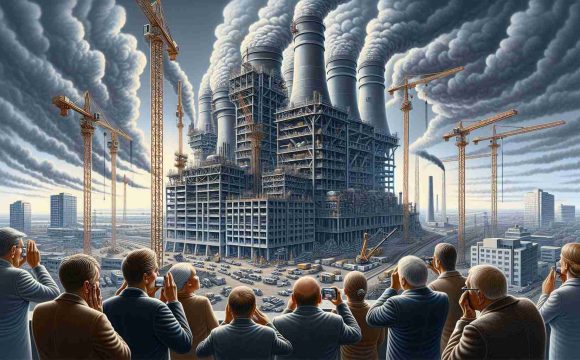North Wales could emerge as a pivotal player in the global green economy, thanks to innovative companies like Material Evolution. This Wrexham-based firm has developed a groundbreaking cement with emissions up to 85% lower than traditional alternatives. Their co-founder, Dr. Liz Gilligan, highlights the area’s rich industrial heritage and its potential to shape new industries through historical knowledge.
Cement production typically involves significant carbon emissions, with the conventional process generating a ton of CO2 for every ton of cement. However, Material Evolution’s MevoCem cement utilizes a unique alkali fusion process that activates waste materials without the need for high-temperature kilns. This innovative approach could permit the plant in Llay to produce an impressive 120,000 tons of eco-friendly cement annually.
While the vision for north Wales as a green hub is promising, experts emphasize the need for strategic investment and improved planning procedures. Dr. David Sprake of Wrexham University indicates that attracting funding will be critical for success in this endeavor.
Moreover, industry leaders like Ashley Rogers from the North Wales Business Council believe it’s vital to preserve current jobs while transitioning to greener alternatives. With supportive initiatives from the Welsh government aimed at nurturing key industries, the region is on track to become a formidable force in the shift toward sustainability.
The question remains: can north Wales truly become the green epicenter it aims to be?
North Wales: The Upcoming Green Economy Powerhouse
North Wales and the Green Economy
North Wales is positioning itself as a significant player in the global green economy, driven by innovations in sustainable materials, particularly in the cement industry. Companies like Material Evolution are at the forefront of this transformation, developing products that significantly reduce carbon emissions compared to traditional methods.
Revolutionary Cement Technology
Material Evolution, a pioneering firm based in Wrexham, has introduced MevoCem cement, which boasts emissions reductions of up to 85% compared to standard cement production. This remarkable achievement stems from a novel alkali fusion process, which activates waste materials in a low-energy manner without the need for traditional high-temperature kilns. The company’s plant in Llay has the potential to produce about 120,000 tons of environmentally friendly cement each year, setting a benchmark for eco-conscious manufacturing.
The Importance of Investment and Planning
Despite this promising innovation, experts agree that North Wales must take strategic steps to attract investment and enhance planning procedures to realize its green ambitions. Dr. David Sprake from Wrexham University emphasizes that securing funding is paramount. These investments will be vital for scaling production and fostering a research and development ecosystem conducive to sustainable practices.
Job Preservation and Economic Transition
As North Wales transitions to greener alternatives, preserving current jobs becomes a critical factor. Ashley Rogers from the North Wales Business Council underscores the need for a balanced approach that fosters environmental technologies while protecting the workforce. The Welsh government is actively supporting initiatives that aim to bolster key industries while advocating for sustainable practices, which will be essential to maintaining economic stability during this transition.
Sustainability Trends in Construction
The global construction industry is increasingly leaning towards sustainable practices, and North Wales is positioned to contribute significantly. Emerging trends in the sector include:
– Use of Recycled Materials: More construction businesses are integrating recycled materials into their projects, reducing waste and harnessing existing resources.
– Energy-Efficient Building Practices: Incorporating energy-efficient designs and sustainable materials is becoming a standard practice for new developments.
– Regulatory Support for Green Technologies: Governments worldwide, including in Wales, are introducing regulations that incentivize sustainable building practices and materials.
Potential Challenges Ahead
While the vision for North Wales as a green hub is compelling, several challenges remain. These include ensuring the availability of vocational training for green technologies and navigating the complexities of environmental regulations. Moreover, competition from other regions with established green economies may pose an additional hurdle.
The Future of North Wales in the Green Economy
As North Wales embarks on this ambitious path toward becoming a green economic center, its success will depend on the collaboration of businesses, government entities, and educational institutions. The region’s historical expertise in industry can serve as a powerful tool in innovating for sustainability. With the right investments and strategic planning, North Wales could indeed emerge as a leading player in the green economy landscape.
For more information on sustainable practices and innovations in construction, visit Welsh Government.






